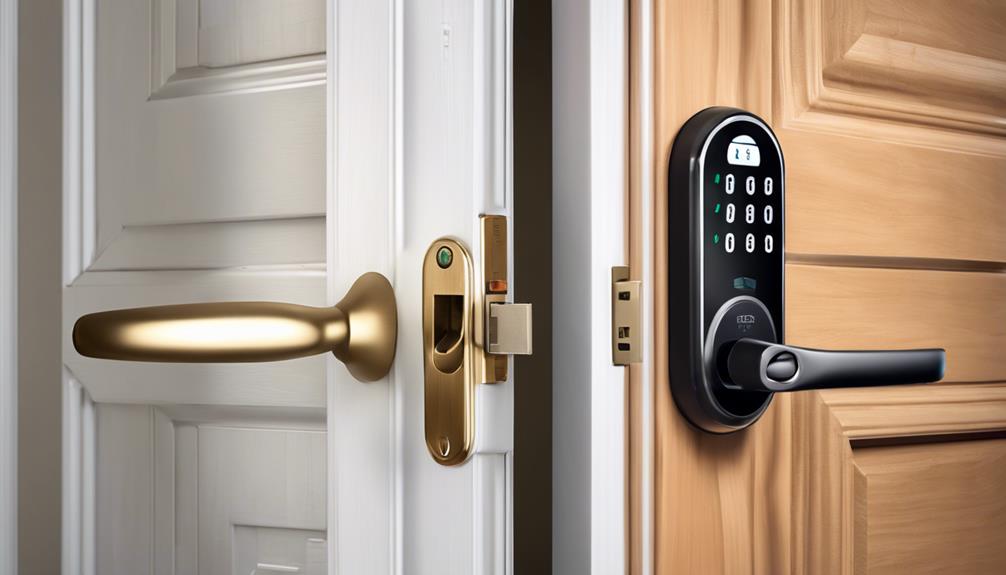When choosing between smart locks and traditional locks, you should consider your security needs. Smart locks offer remote access, temporary codes, and real-time monitoring, but they're vulnerable to hacking and require strong passwords. Traditional locks provide reliable protection with mechanical strength and are less prone to tech failures, yet they can be picked or bumped. Smart locks excel in convenience and access control, while traditional locks deliver simplicity and durability. Each has its pros and cons, so you'll want to weigh those factors carefully to make the best choice for your home. There's much more to explore on this topic.
Key Takeaways
- Smart locks offer remote access and temporary codes, enhancing convenience but introducing vulnerabilities to hacking and power failure risks.
- Traditional locks provide reliable physical security through mechanical barriers, making them less susceptible to cyber threats but requiring effective key management.
- Smart locks feature user activity logs for accountability, while traditional locks rely on direct key management for access control.
- Both types of locks can face vulnerabilities: smart locks may be hacked or malfunction, while traditional locks can be picked or bumped.
- Hybrid lock systems combine features of both smart and traditional locks, balancing modern convenience with physical security mechanisms.
Overview of Smart Locks
Smart locks are revolutionizing the way you secure your home. They offer convenience and advanced features that traditional locks simply can't match.
With smart lock security, you can lock and open your door remotely using your smartphone, making it easier to control access for family, friends, or service providers. This technology also allows you to grant temporary access, ensuring your loved ones can always reach you, even when you're not home.
Weighing the benefits and drawbacks of smart locks is vital for making an informed choice. However, it's important to be aware of smart lock vulnerabilities. While these devices enhance security, they can also expose you to lock hacking risks if not properly managed.
Cybercriminals may exploit weak passwords or outdated firmware, so it's imperative to stay vigilant. Regularly updating your smart lock's software and using strong, unique passwords can greatly reduce these risks.
As you explore smart locks, consider how they can serve not just your needs but also the safety of those around you. By understanding both the benefits and potential pitfalls, you can make an informed decision that enhances your home's security without compromising safety.
Embrace the future of home security while prioritizing the protection of your loved ones.
Overview of Traditional Locks
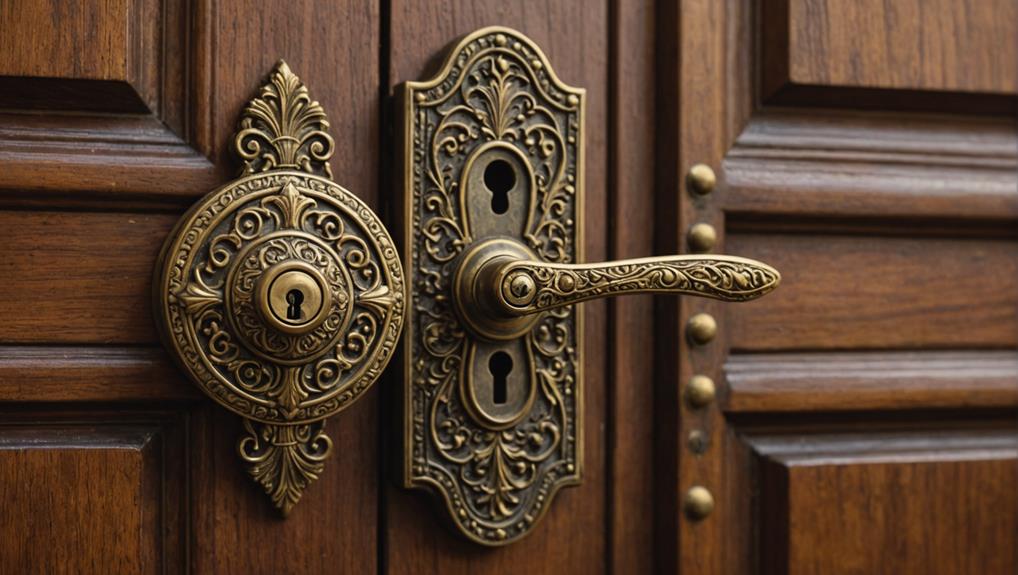
Traditional locks have been the cornerstone of home security for centuries, providing a reliable way to safeguard your belongings. When you think about traditional lock security, you often envision a simple key mechanism that's easy to understand and use.
These locks, whether they're deadbolts, knob locks, or lever locks, offer a physical barrier against unauthorized entry. Additionally, traditional locks can be re-keyed, allowing for enhanced security without the need to replace the entire lock system, making them a flexible option for homeowners concerned about previous key access security insights.
You'll find that secure traditional locks can be incredibly effective when installed correctly and maintained properly. Many people appreciate the tactile nature of these locks; inserting a key and hearing the familiar click brings a sense of reassurance.
In a lock security comparison, traditional locks often score high due to their straightforward design and durability. While they may not offer the tech features of smart locks, they've a long-standing reputation for reliability.
Moreover, they're often less susceptible to hacking or software glitches, which can be a concern with modern alternatives.
Ultimately, choosing traditional locks means valuing proven security methods that have kept homes safe for generations. Understanding these locks can help you make informed decisions about your home's security needs.
Security Features of Smart Locks
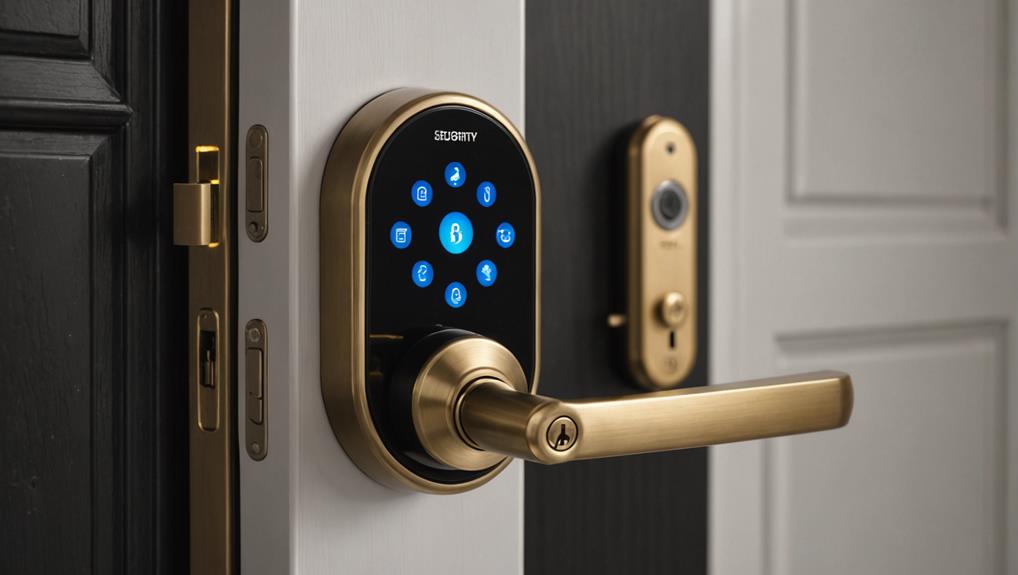
Smart locks offer a range of security features that set them apart from traditional locks.
With advanced technology, these locks provide enhanced access control options that let you manage who enters your home, including the ability to grant temporary access to guests or service providers.
Additionally, many smart locks come equipped with intrusion detection systems that alert you to potential breaches, ensuring that you're always informed about the security of your home.
Plus, with remote monitoring capabilities, you can keep an eye on your property from anywhere, giving you peace of mind and improved security features.
Access Control Options
In today's digital age, access control options for securing your home have evolved considerably.
With smart locks leading the charge, you can offer your guests unparalleled convenience and security.
When comparing smart vs traditional locks, it's clear that smart locks provide more versatile access control features.
Here are four key options to evaluate:
- Keyless Entry: No more fumbling for keys. You can open your door with a simple code or your smartphone.
- Temporary Access Codes: Need to let a friend in while you're away? Generate a temporary code that expires after a set time.
- Remote Access: Lock or open your door from anywhere, allowing you to manage who enters your home and when.
- User Activity Logs: Keep track of who enters your home and when, giving you peace of mind and the ability to serve your community better.
For those aiming to find the best lock for security while also facilitating easy access, smart locks shine in this domain.
Embrace the future of home security and enjoy the enhanced control and flexibility they provide.
Intrusion Detection Systems
Many homeowners appreciate the added layer of security that intrusion detection systems offer in conjunction with smart locks. These systems work by monitoring entry points for unusual activity, helping you feel more secure in your home. When paired with smart locks, they create a robust defense against unauthorized access.
Imagine receiving an alert on your smartphone if someone tries to tamper with your door. This immediate feedback allows you to act quickly, whether calling for help or simply checking on your home.
Intrusion detection systems often include motion sensors and door/window sensors, ensuring that every potential breach is monitored. You can also customize these systems to suit your needs, enabling alerts only during specific hours or when you're away.
This flexibility helps you maintain your peace of mind, knowing that your home is being actively monitored. While traditional locks provide basic security, combining them with intrusion detection systems elevates your home's safety measures.
Remote Monitoring Capabilities
With the rise of smart home technology, remote monitoring capabilities have become a key feature of smart locks.
These features not only enhance security but also offer convenience, allowing you to serve others by ensuring their safety. You can monitor your home in real-time, giving you peace of mind whether you're at work or on vacation.
Here are four essential remote monitoring capabilities of smart locks:
- Live Alerts: Receive instant notifications when someone enters or exits your home, helping you stay informed about who's coming and going.
- Remote Access Control: Grant or revoke access to family members, friends, or service providers from anywhere, ensuring that only trusted individuals can enter your space.
- Activity Logs: Track who accessed your home and when. This feature can help you identify any unusual activity, enhancing your ability to respond quickly.
- Integration with Security Systems: Smart locks can work alongside other smart devices, like cameras and alarms, providing a thorough security solution.
Security Features of Traditional Locks
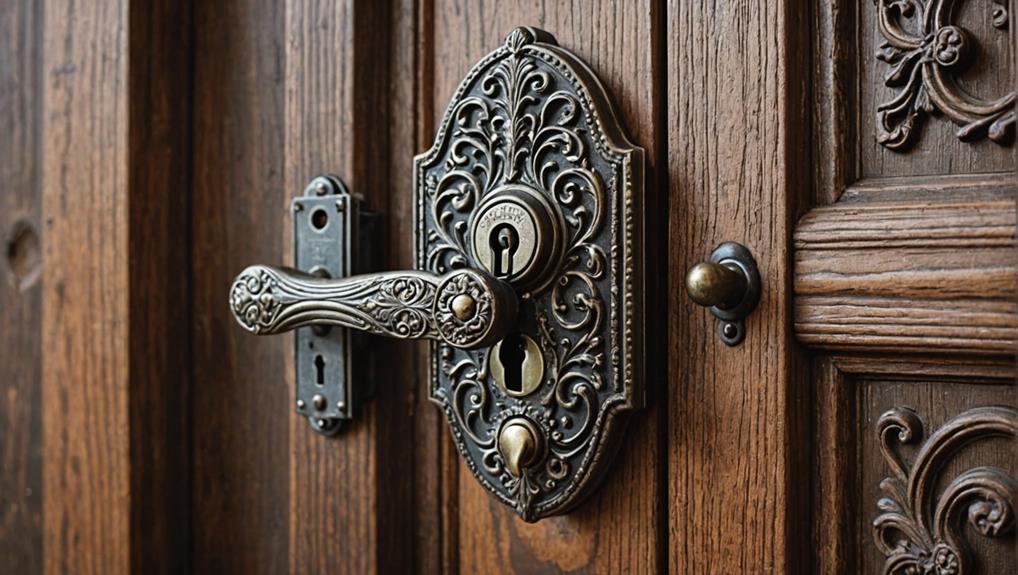
When you think about traditional locks, their mechanical strength and durability stand out as key features.
These locks often incorporate hardened steel components and anti-drill plates, making them resistant to a variety of attacks.
These locks provide robust protection against forced entry, ensuring your home stays secure.
Plus, controlling access with physical keys gives you a tangible sense of security that some find reassuring, as opposed to more complex systems like high-security locks that offer enhanced protection and features like key control and restricted access the advantages of high-security locks.
Mechanical Strength and Durability
The mechanical strength and durability of traditional locks offer a sense of reliability that's hard to overlook.
These locks are designed to withstand physical force, making them a trusted option for securing homes and businesses alike. When you consider their features, you'll find several key advantages that showcase their robustness:
- Solid Materials: Traditional locks often use hardened steel or brass, which resists wear and tear over time.
- Resistant to Tampering: The intricate designs of these locks can deter unauthorized access, making it difficult for intruders to pick or force them open.
- Long Lifespan: With proper maintenance, traditional locks can last for decades, providing you with ongoing peace of mind.
- Simple Mechanics: The straightforward construction means fewer points of failure compared to more complex smart locks.
Choosing traditional locks not only guarantees mechanical strength but also reflects a commitment to providing secure environments for those you care about.
Key Control and Access
How do you guarantee that only trusted individuals have access to your property? With traditional locks, key control becomes a straightforward yet effective method. You hold the power of who gets a key, allowing you to manage access clearly and directly. Each key you hand out represents a level of trust, ensuring only those you know and rely on can enter your space.
When you decide to change your locks, you completely reset access. If a key goes missing, replacing the lock can prevent any unauthorized entry, giving you peace of mind. You can also limit the number of copies you make, ensuring that only essential individuals have keys. This is especially important in shared spaces where trust is crucial.
Furthermore, traditional locks don't rely on batteries or technology that can fail. Their simplicity means you don't have to worry about hacking or software issues, keeping your access control straightforward.
Common Vulnerabilities in Smart Locks
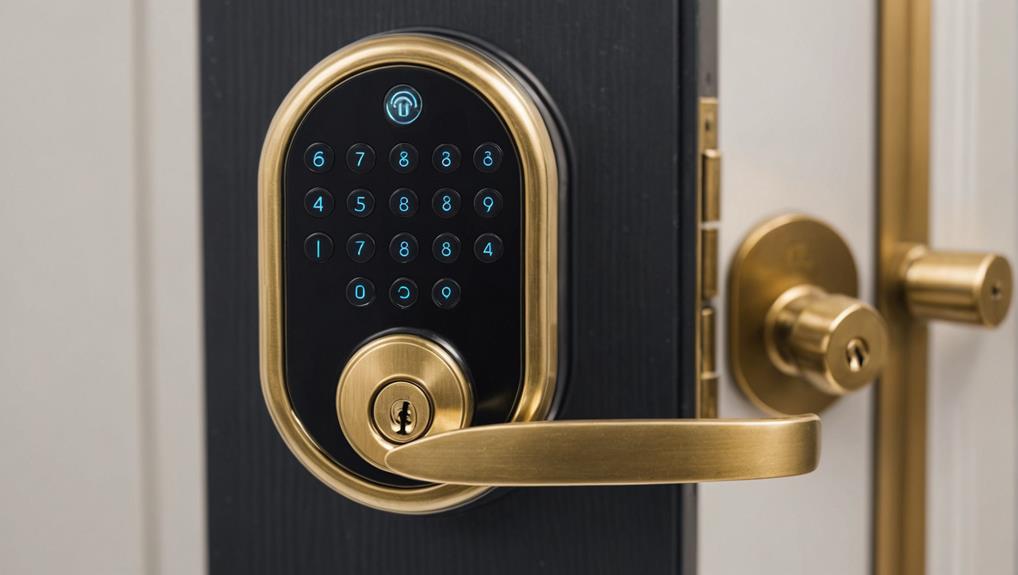
Smart locks may offer convenience and modern features, but they come with their own set of vulnerabilities that users should be aware of.
As highlighted in a user experience review, while smart locks can enhance accessibility, they also introduce unique challenges that could compromise security. Understanding these weaknesses can help you make informed decisions to better protect yourself and those you care about.
Here are four common vulnerabilities in smart locks:
- Hacking Risks: Smart locks connect to your home network, making them susceptible to hacking. Cybercriminals can exploit weak passwords or outdated firmware to gain access.
- Power Failures: Many smart locks rely on batteries or electrical power. If the power goes out or batteries die, you might find yourself barred from entry without a backup entry method.
- Bluetooth Vulnerabilities: Some smart locks use Bluetooth for connectivity. If you're within range, an attacker could potentially intercept the signal and open your door.
- Software Bugs: Like any technology, smart locks can have software glitches. These bugs can lead to malfunctioning locks, leaving your home vulnerable.
Common Vulnerabilities in Traditional Locks
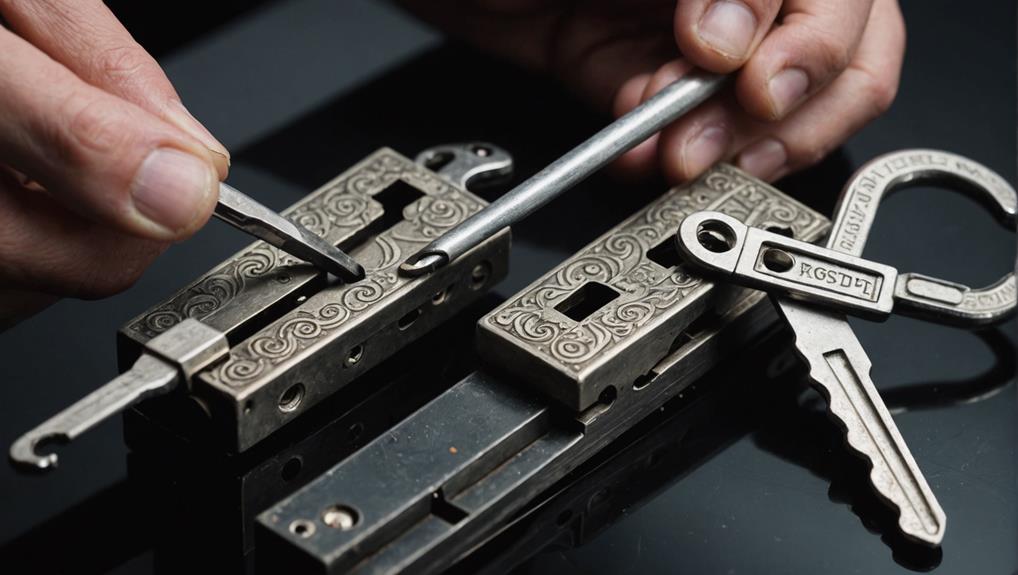
While smart locks come with their own set of vulnerabilities, traditional locks aren't without their issues either. Understanding these vulnerabilities is vital, especially if you're committed to serving the safety of your community. Traditional locks can be easily compromised, often with minimal tools or skills. Here's a quick look at some common vulnerabilities:
| Vulnerability | Description |
|---|---|
| Lock Picking | Skilled intruders can manipulate the lock's mechanism. |
| Bumping | A specially shaped key can open many cylinder locks. |
| Key Duplication | Standard keys can be easily copied, sometimes without permission. |
| Weak Materials | Poor-quality locks can break or bend under pressure. |
| Lack of Reinforcement | Doors without additional security measures are more susceptible to force. |
These vulnerabilities highlight the importance of choosing the right lock for your home or business. By being aware of these issues, you can better serve your loved ones and community by ensuring they're protected. Consider reinforcing your traditional locks or exploring additional security measures to enhance safety. The more proactive you are, the safer everyone will be.
User Access and Control
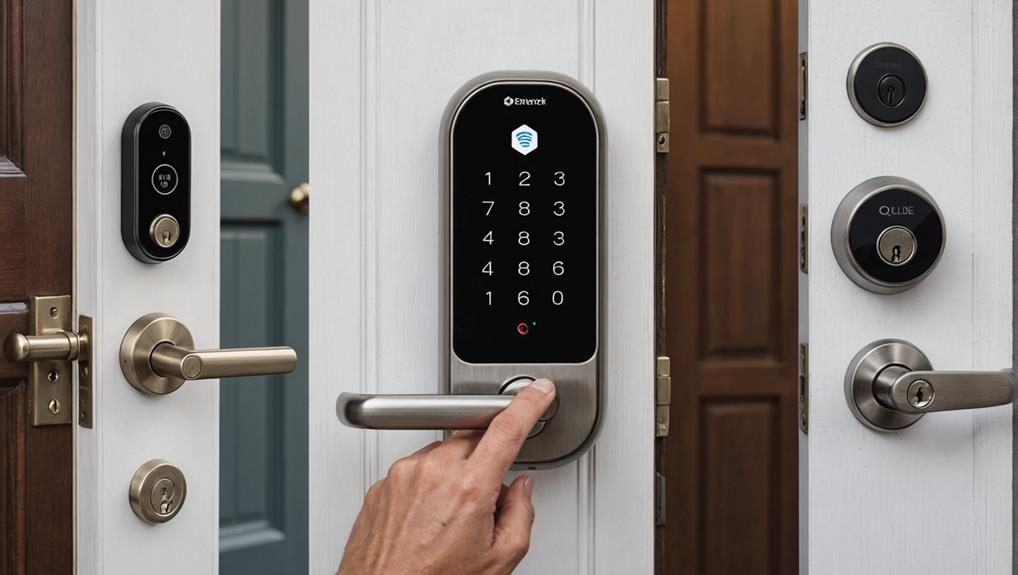
User access and control are essential aspects of modern security systems, particularly when comparing smart locks to traditional ones.
With smart locks, you gain the ability to manage who enters your home with unprecedented ease. You can program access for family members, friends, or service providers, ensuring that only those you trust can enter.
Additionally, when considering the overall investment, it's important to factor in the costs associated with installation and maintenance for both types of locks, which can influence your decision.
Here are four advantages of user access and control with smart locks:
- Remote Management: You can grant or revoke access from anywhere using a smartphone app.
- Temporary Codes: Create time-limited access codes for guests or service workers, ensuring they can only enter when needed.
- Activity Logs: Monitor who entered and exited your home, providing peace of mind and accountability.
- Keyless Entry: Eliminate the need for physical keys, reducing the risk of loss or theft.
In contrast, traditional locks often require you to be physically present to provide access.
This limitation can hinder your ability to serve others effectively. By choosing smart locks, you empower yourself to manage access seamlessly, enhancing both security and convenience for everyone involved.
Emergency Situations and Lockouts
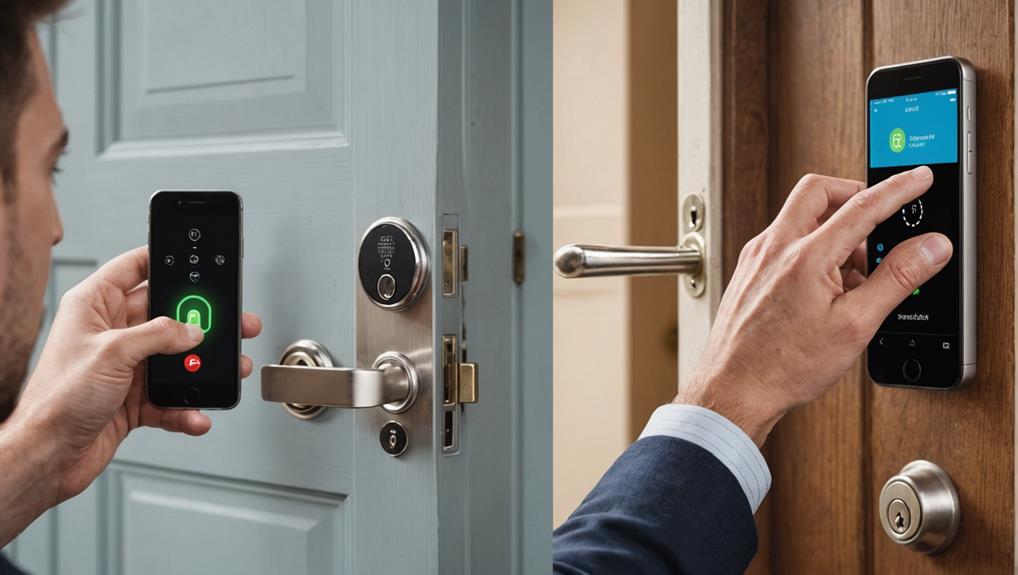
In emergencies, the ability to access your home quickly can make all the difference. Whether you're rushing home due to a family crisis or dealing with a medical emergency, your locks should work with you, not against you.
Traditional locks can pose challenges during lockouts; if you lose your keys or they break, you may find yourself stuck outside, waiting for help. In such cases, understanding the difference between re-keying and reprogramming smart locks can be advantageous, as it allows for quick adjustments to your security without the need for physical keys.
Smart locks, on the other hand, often provide keyless entry options, allowing you to gain entry to your door using your smartphone or biometrics. This can save precious time in urgent situations. You can also share temporary access codes with trusted friends or family, ensuring they can help you in a pinch.
However, not all smart locks are created equal. If the power goes out or your battery dies, you might face the same lockout issues as with traditional locks.
It's essential to have a backup plan, like a spare key hidden securely or a reliable locksmith on speed dial. Ultimately, choosing the right locking system involves considering how well it serves you and your loved ones in those significant moments when every second counts.
Future Trends in Lock Security
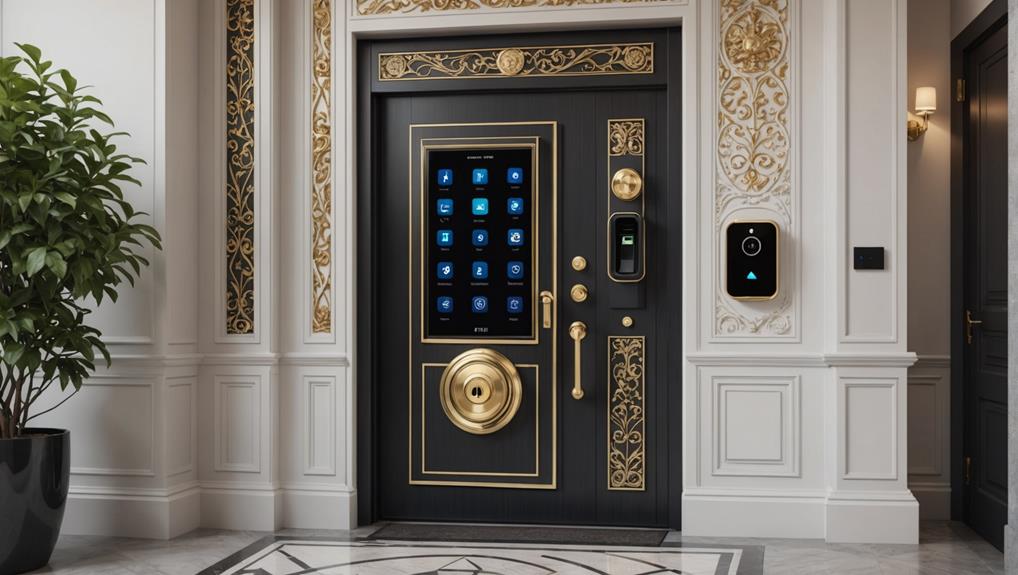
The evolution of lock security is rapidly transforming the way we protect our homes. As technology advances, you can expect to see exciting trends that enhance safety and convenience for everyone.
One notable innovation is the emergence of hybrid lock systems that blend traditional and smart features, offering a balance of security and user-friendliness. These systems can address concerns about reliance on technology while providing enhanced access control for users, showcasing the pros and cons of hybrid lock systems.
Here are four future trends in lock security that you should keep an eye on:
- Biometric Access: Imagine using your fingerprint or facial recognition to open your door. This technology will provide convenience while ensuring that only authorized individuals can enter.
- Smart Home Integration: Locks will increasingly connect with your other smart devices, allowing you to control your security system from your smartphone. You'll be able to monitor access and receive alerts in real-time.
- Improved Cybersecurity: As smart locks become more prevalent, manufacturers will focus on bolstering their security measures to protect against hacking. This means peace of mind for you and your loved ones.
- Remote Access Management: You'll gain the ability to grant or revoke access remotely. Whether it's a family member or a service provider, you can manage who enters your home from anywhere.
These trends promise to make homes safer and more accessible, serving both your needs and those of your community.
Frequently Asked Questions
How Do Smart Locks Perform in Extreme Weather Conditions?
Smart locks can face challenges in extreme weather, but they're designed with durability in mind.
When temperatures drop or rise considerably, you might notice battery life fluctuates, so it's wise to check it regularly.
Rain and snow can affect sensors, but many models are weather-resistant.
To guarantee reliable performance, keep the lock clean and consider a model specifically rated for harsh conditions.
This way, you're prepared for whatever Mother Nature throws your way.
Can Traditional Locks Be Easily Installed Without Professional Help?
Yes, you can install traditional locks without professional help, and it's often straightforward.
You'll just need a few basic tools like a screwdriver and a drill. Follow the instructions that come with the lock, and you'll find the steps are usually simple.
Just make sure you measure your door correctly and align everything properly.
With a little patience, you'll have it installed in no time, enhancing your home's security with confidence.
What Happens if the Smart Lock Battery Dies?
Imagine your smart lock as a vibrant flower, flourishing with life until it wilts without water. If the battery dies, you won't be able to open it electronically, leaving you locked out.
However, most smart locks have a backup key option, so you can still access your space. Keeping a spare battery handy or a traditional key close by guarantees you're always ready to serve others while maintaining your security.
Are There Insurance Benefits for Using Smart Locks?
Yes, there can be insurance benefits for using smart locks.
Many insurance companies recognize the added security smart locks provide and may offer discounts on your premiums.
By installing a smart lock, you're not only enhancing your home's security but also potentially saving money.
It's worth checking with your insurer to see if they provide any incentives for using smart home technology, making your home safer while keeping your budget in check.
How Do Smart Locks Integrate With Home Automation Systems?
Smart locks easily integrate with home automation systems, enhancing your home's convenience and security.
You can control them remotely through your smartphone or voice assistant, allowing you to lock or open your doors from anywhere.
They often work with other smart devices, like cameras and alarms, giving you a thorough security solution.
Conclusion
To sum up, whether you choose smart locks or traditional ones, each has its strengths and weaknesses. Did you know that according to a recent survey, over 70% of homeowners are considering smart locks for their next upgrade? This growing trend highlights the appeal of enhanced security and convenience. Ultimately, it's about finding the right balance between technology and reliability that fits your lifestyle. Stay informed, and you'll make the best choice for your security needs!

